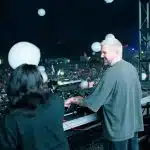Deep House music has been a staple in the world of electronic dance music for many years, providing a soulful and atmospheric sound that has captured the hearts of music lovers all over the world.
This genre of music is characterized by its smooth grooves, jazz-inspired samples, and warm, inviting vocals. It’s the perfect music to relax to after a long day or to get lost in at a club or rave.
Whether you’re a seasoned fan or just discovering the genre, this blog is dedicated to exploring the world of Deep House and everything that makes it so special.
So sit back, turn up the volume, and let the music take you on a journey.
Table of Contents
What is Deep House Music?
Deep house music is a genre of house music. It has a soulful, deep sound that is often played in chill-out sessions and at after-hours parties.
While the style has evolved over the years, the essence of deep house music remains the same: soulful, emotive tracks with infectious beats.
Originating in Chicago in the early 1980s, deep house music was created by DJs who wanted to create a slower, more soulful alternative to the upbeat disco tracks that were popular at the time.
The tracks are typically longer than mainstream house music, with a mellower tempo and less percussion.
Deep house music often features soulful vocals or jazzy instrumentation and is often used for after-hours clubbing or chill-out sessions.
Some of the biggest names in deep house music include Disclosure, Duke Dumont, and Jamie xx.
Why is it Called Deep House?
The name “deep house” is said to come from the fact that the tracks are slower and deeper than mainstream house music.
It’s also said that the deep moniker was given to the genre because of its soulful sound, which often features complex chord progressions and emotive melodies.
What are the Characteristics of Deep House Music?
The characteristics of deep house music vary depending on the artist, but there are some defining features that are common to many deep house tracks.
1. Soulful
Deep house music is often soulful and emotive, with a slow tempo and mellower sound than mainstream house music.
2. Jazzy
Many deep house tracks feature jazzy instrumentation, such as saxophones and Hammond organs.
3. Chill-Out
Deep house music is often played in chill-out sessions and at after-hours parties.
4. Instrumental
Many deep house tracks are instrumental, with soulful vocals or jazzy instrumentation.
5. Slow Tempo
The tempo of deep house music is typically slower than mainstream house music.
6. Less Percussion
Deep house music features less percussion than mainstream house music, with a focus on soulful melodies and beats.
What are the Best Deep House Tracks?
The best deep house tracks vary depending on the listener’s taste, but some of the tracks that are often considered to be the best include
Disclosure’s “Latch,” Duke Dumont’s “The Giver” and Jamie xx’s “Sleep Sound.”
Types of Deep House Subgenres
Within the genre of deep house, there are also some subgenres to know about such as:
1. Soulful Deep House
This subgenre features soulful vocals and emotive tracks with a slower tempo.
2. Chill-Out Deep House
This subgenre is perfect for chill-out sessions, with mellower tempos and less percussion.
3. Instrumental Deep House
This subgenre features soulful vocals or jazzy instrumentation and a slower tempo.
4. Tech House
This subgenre is harder-edged than deep house, with more electronic sounds and a faster tempo.
5. Progressive Deep House
This subgenre features more complex chord progressions and melodies, and a slower tempo.
What is the Difference Between House and Deep House?
The difference between house and deep house is that deep house is a subgenre of house music.
It has a slower tempo and less percussion than mainstream house music and is often played in chill-out sessions or at after-hours parties.
House music is a genre of electronic dance music that originated in Chicago in the early 1980s. It has a faster tempo and more percussion than deep house, and is typically played at mainstream nightclubs.
How Can I Listen to Deep House Music?
There are many ways to listen to deep house music, including:
- Spotify
- Deezer
- Apple Music
- SoundCloud
- YouTube
- Beatport
- Traxsource
- Pandora
Popular Deep House Artists
Some of the most popular deep house artists include:
- Disclosure
- Lane 8
- Duke Dumont
- Jamie xx
- The Martinez Brothers
- Nic Fanciulli
- Richie Hawtin
- Sacha Robotti
- Solardo
Soulful Deep House Tracks
Some of the best soulful deep house tracks include:
Latch – Disclosure
The Giver – Duke Dumont
Sleep Sound – Jamie xx
Nightjar – Vintage Culture, Sonny Fodera Feat. SHELLS
Catch & Release (Deepend Remix) – Matt Simons
Where do Deep House DJs Play?
Deep house DJs typically play at events and venues that focus on chill-out music, such as:
- Chill-Out Rooms
- After-Hours Parties
- Beach Clubs
- Open-Air Festivals
- Smokey Bars
There is no one answer to this question as deep house DJs can be found playing at a variety of events and venues. However, some places that are known for their deep house nights include:
- The Warehouse Project in Manchester, England
- Club Space in Miami, Florida
- Pacha in Ibiza, Spain
- DSTRKT in London, England
- Cielo in New York City, New York
If you are looking to listen to some deep house near you, then we recommend finding a deep house DJ that you like and following where their tours go. There might be a chance they are playing somewhere near you!
Is Deep House Still Popular?
Yes, deep house is still popular and continues to grow in popularity.
This is likely due to the fact that deep house provides a more soulful and emotive listening experience than mainstream house music.
Additionally, there is a growing number of DJs and producers who are focusing on creating deep house tracks, which helps to keep the genre fresh and evolving.
Frequently Asked Questions
What is the difference between deep house and progressive house?
Deep House is characterized by its atmospheric sound and slower tempo, while Progressive House is characterized by its energetic and uplifting sound and faster tempo.
What is the difference between techno and deep house?
Techno is characterized by its fast tempo, repetitive beats, and abrasive sound, while Deep House is characterized by its soulful, atmospheric sound and slower tempo.

Starting with my first EDM event in 2010 at Nocturnal Wonderland and hearing One by Swedish House Mafia and Benny Bennassi’s “Satisfaction” I have been hooked on EDM. While Above&Beyond and Anjunabeats captured my heart in 2012, the genre I love the most is Hardstyle and I feel the most alive when listening to it. My favorite part about the EDM world is the energy that is packed into each genre fan base and event. Writing for Deep In The Mix gives me the opportunity to contribute back to the EDM world I love so much.







